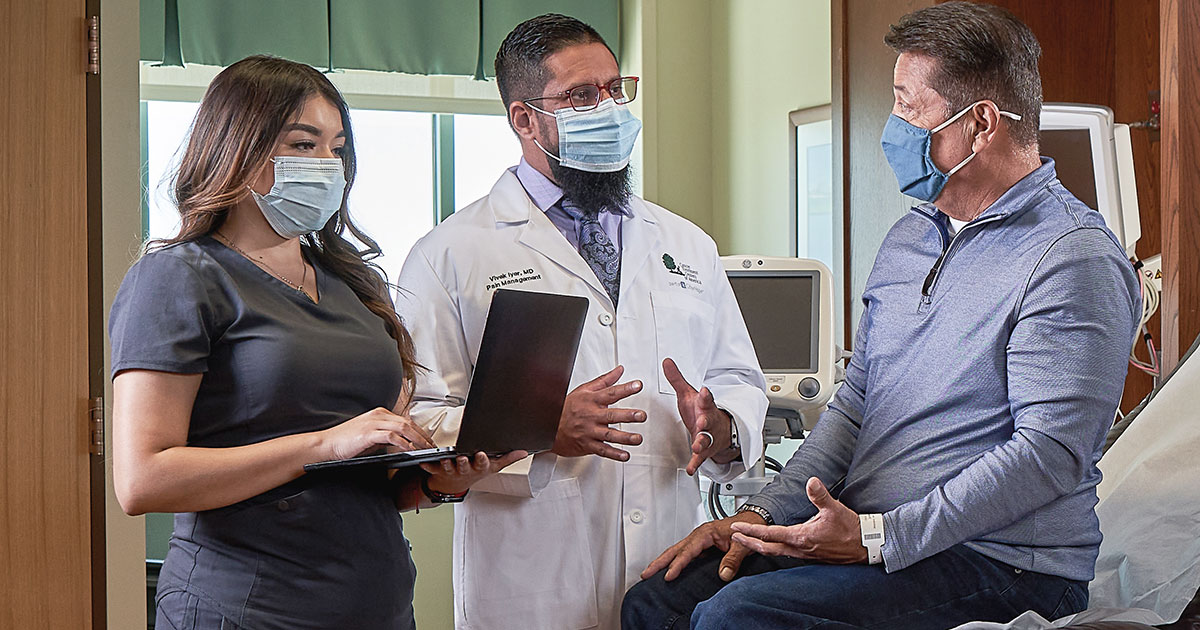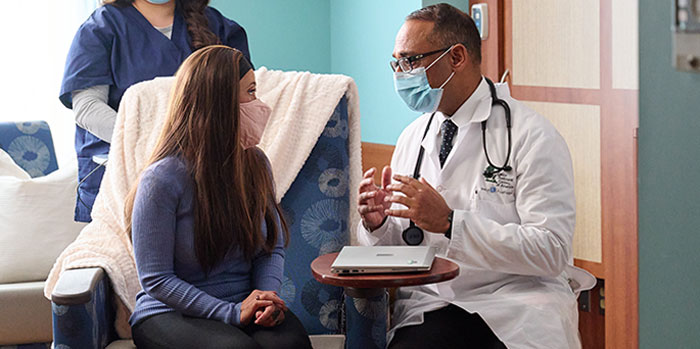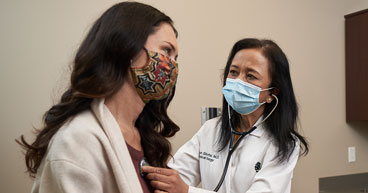
A cancer diagnosis often triggers lots of questions: What does this mean for my future? How should I tell my family? What will treatments look like?
And, of course: How did I get cancer?
Some people may even wonder if they can give their cancer to someone else.
While it’s common for cancer patients to experience confusion and anxiety after their diagnosis, it’s equally important for them to keep in mind some tried-and-true facts about the disease—namely, that cancer is not contagious, meaning it can’t be passed on to someone through physical contact, proximity or other exposures.
That’s critical for family and friends of cancer patients to know, too. Even in today’s modern society, some people stay away from loved ones with cancer because they’re afraid of “catching” the disease.
In this article, we’ll explore some common questions and related topics, including:
- Is cancer contagious?
- A controversial experiment
- Animals and cancer
- Is cancer infectious?
- How can I help a loved one with cancer?
If you’ve been diagnosed with cancer and are interested in a second opinion on your diagnosis and treatment plan, call us or chat online with a member of our team.

Is cancer contagious?
Cancer forms when abnormal cells in the body begin to grow out of control. As these cells multiply, they have the potential to form a mass of malignant tissue, called a tumor, and eventually spread to other parts of the body.
While cancer may spread in the body, it can’t spread from person to person through contact. In other words, you can’t “catch” cancer from someone else.
Unlike viruses that can easily spread among a population, like the flu or COVID-19, cancer isn’t considered an infectious disease. Even in cases where several members of the same family, workplace or community develop the same type of cancer, it’s not because of a contagion, but other factors, such as:
Genetics: A person may inherit specific gene mutations known to increase cancer risk. For instance, mutations in the BRCA1 and BRCA2 genes may be passed on from mother or father to daughters, increasing their risk of developing breast and ovarian cancer, or to sons, increasing their risk of breast and prostate cancer.
Lifestyle: Behaviors like tobacco use may increase cancer risk, even among those who don’t smoke but who are exposed to secondhand smoke. Poor diets, alcohol abuse, obesity and a sedentary lifestyle may also increase risk.
Exposure to carcinogens: Being exposed to cancer-causing agents like radon gas or asbestos may increase cancer risk for family members living in the same home. And shared exposure to certain carcinogens, such as contaminated water, may result in widespread cancer cases in a community, known as a cancer cluster.
A controversial experiment
In the 1950s and 1960s, Dr. Chester Southam, a New York immunologist, conducted several controversial experiments by injecting live cancer cells into cancer patients and healthy prisoners without telling them.
Dr. Southam was widely criticized for his experiments and had his medical license suspended for one year, but he did find that while patients in both studies grew tumors, the prisoners’ cancers were quickly attacked and eliminated by their immune systems—exactly how the immune system is designed to work when it encounters foreign cells, including in the case of organ donations and bone marrow transplants.
Indeed, getting foreign cells to “take” in the body requires significant immunosuppression. That’s why people who want to donate their organs are carefully screened for cancer. Organ recipients often take medicines to weaken the immune system so it doesn’t try to destroy the transplanted organ. Only in rare cases has cancer been linked to the organ donor having the disease.
“Fortunately, survival of transplanted cancers in healthy humans is exceedingly rare and documented by only a small handful of cases,” Dr. James S. Welsh, a radiation oncologist currently with Loyola Medicine, wrote in a 2011 article on contagious cancer. “Thus, friends and family members of cancer patients and we, as caregivers of cancer patients, need not be unduly concerned with the remote possibility of ‘catching cancer.’”
This is also true in the case of pregnant women with cancer. Only in very rare cases does the disease affect the baby, although certain types of cancer may spread from the mother to the placenta.
Animals and cancer
Animals can’t pass cancer to humans, but some of the misconceptions surrounding how people get cancer may have come from reports of certain animals passing the disease to one another.
Dogs can become infected with a type of cancer called canine transmissible venereal tumor (CTVT), for instance, when cells are transferred between animals when they mate. Similarly, Tasmanian devils can develop a cancer called devil facial tumor disease (DFTD), which develops when living cells are transferred between animals when they bite one another. Yet dogs with CTVT can usually fight off the disease, while Tasmanian devils typically die within six months. In fact, DFTD has wiped out roughly 90 percent of the species.
In his article, Dr. Welsh wrote that studying contagious cancers in animals may lead to a better understanding of the disease in humans. He pointed out that, like cancers in humans, DFTD comes in various types, and researchers have found that some Tasmanian devils may develop immunity to some types but not others.
“Subtleties of DFTD immunity along with the immunity to CTVT in dogs are important for their pure scientific interest,” Dr. Welsh wrote. “Similarly, the natural resistance humans possess against transmitted malignancies … is of scientific interest.”
In this way, studying these two known, naturally occurring, contagious cancers and identifying what may lead to improved immunity to CTVT in dogs or DFTD in Tasmanian devils may hold clues to new or better ways to treat and maybe even prevent cancer in humans.
Is cancer infectious?
They may not be able to “catch” cancer, but humans can spread contagious viruses that may lead to cancer.
For example, each year, about 47,000 cases of cancer are diagnosed in parts of the body where human papillomavirus (HPV) may be found, and the U.S. Centers for Disease Control and Prevention (CDC) says the virus may cause most of them.
HPV infections are responsible for virtually all cases of cervical cancer and are linked to most cases of:
HPV is just one of many viruses linked to certain types of cancer. The Epstein-Barr virus (EBV) may increase a person’s risk of nasopharyngeal cancer and certain types of lymphomas, such as Burkitt lymphoma.
The hepatitis B and C viruses may lead to hepatocellular carcinoma, the most common type of liver cancer. And human immunodeficiency virus (HIV), the virus that causes acquired immune deficiency syndrome (AIDS), is linked to a higher risk of developing cervical cancer and Kaposi sarcoma, as well as certain kinds of non-Hodgkin lymphoma. “HPV is a virus, and it’s spread sexually and can cause cancer,” says Suji V. Mathew, MD, Infectious Disease Physician and Chief of Medicine at City of Hope Atlanta. “You can have someone with HPV who infects his or her sexual partner, and that person may get cancer. So, is cancer contagious? No. But some viruses that can cause cancer are.”
How can I help a loved one with cancer?
Even though cancer is not contagious, a cancer patient may feel as if they’re being or shunned or cut off—that others don’t want to be around them. Friends may no longer call or come by. Relatives may treat them differently.
Remember, if a friend, family member or loved one has cancer, they cannot pass it on to you. In fact, some patients may want or need you to be closer than ever.
You can show your support for a family member or friend with cancer in lots of ways, including by:
- Visiting or calling
- Watching a movie, playing a game, listening to music or taking a walk together
- Running errands or helping around the house
- Giving a gift, like soft socks or a cozy blanket
- Driving the kids to and from school, sports and other activities
- Making meals, picking up groceries or arranging for them to be delivered
- Picking up prescriptions
And while you can’t catch cancer from them, cancer patients may be able to catch an illness from you. And because they often have suppressed or compromised immune systems, they’re more vulnerable to infection. So, when you’re visiting, it’s important to take steps, such as wearing a mask and washing your hands, to protect them from contagions.
If you’ve been diagnosed with cancer and would like to learn more about our treatment options, or if you’re interested in a second opinion about your cancer diagnosis and treatment plan, call us or chat online with a member of our team.

